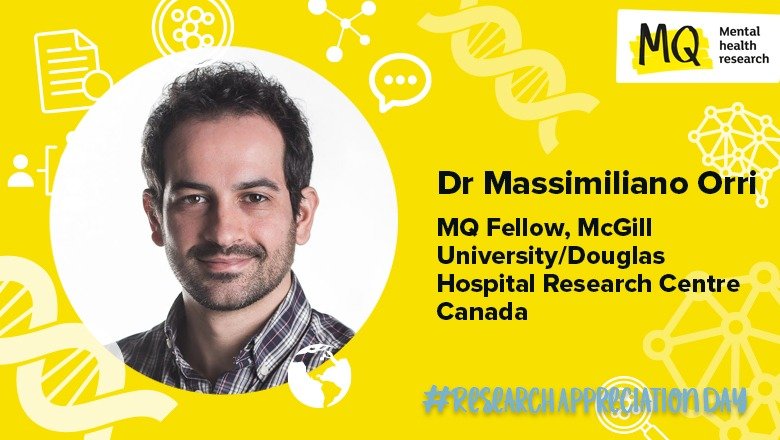Research Appreciation Day: Introducing Dr Massimilano Orri

On 5 July 2023 MQ Mental Health Research celebrate Research Appreciation Day, a time to appreciate the impact research has and those dedicating their lives to it. In the run up to the day, we’re introducing to you a few of our recent research fellows to show you the people behind the research.
Research Appreciation Day – Introducing Dr Massimiliano Orri
Name: Massimiliano Orri, MQ Fellow 2022, McGill University / Douglas Hospital Research Centre, Canada
Career background: both research and clinical (psychology)
Currently researching: suicide prevention
What did you want to be when you were a child?
I wanted to study animals and their behaviour. I still love animals (my horse can testify that!) but I ended up studying human behaviours instead.
Why did you first become interested in research?
During my initial training in clinical psychology. While trying to understand single individuals and their uniqueness, I felt the need to look at human behaviour and mental health from a broad perspective, as well as to be able to directly ask questions I was interested in understanding. Becoming a researcher was the logical next step
What drew you to this field of research?
I study suicidal behaviour. I found myself fascinated by the possibility to better understand why some people at some point in their life do not perceive their life as worth living, and to find ways to help them overcome such difficult moments. All my role models in research are humble despite (what I consider) great achievement.
What’s the day-to-day life of working in research?
Day to day research is like working on a puzzle. Day-to-day the objective is to connect one small piece to another, and still being far from the final result. However, it is impossible to do that without having in mind the big picture and being aware of the final objective all along the way.
What’s the culture of research like?
Working in research can be great, as the environment is full of people passionate about their work and eager to connect and explore new ideas. However, it is also a stressful environment, with a lot of competition for limited resources and somewhat rigid academic requirements.
What has been the highlight of your role in research so far?
I had the chance to work alongside brilliant and very motivated students. Seeing their enthusiasm and improvement in skills over time and being able to help them to develop research skill, master a subject, and becoming confident in themselves is surely a great satisfaction.
In general though, the best thing about working in research is the freedom to explore your interests and to challenge yourself continuously.
Tell us about your 2022 Fellows programme research – we’re fascinated!
My project for the 2022 Fellows program aims to understand the risk of premature mortality, especially by suicide, of youth that experience co-occurring mental and physical disorders. Often there is a separation between “mental” and “physical” health, but in fact they are essential part of our well-being, and they mutually influence each other. This is very evident in my own clinic practice, especially for adolescents and young adulthood, which are in a very important yet fragile period of their lives.
However, research on the topic is still scant. I hope that this research project will bring awareness on the importance of considering both aspect – physical and mental – of health and to address the challenging of those young people.
What has it been like to work with MQ?
I first heard about MQ because a colleague has been awarded an MQ Fellowship at the beginning of his career a couple of years ago. I could see that this skyrocketed his career, and that MQ played a great role in giving visibility to my colleague’s research.
In 2022, less than a year into my assistant professor appointment, the topic of the Fellowship was perfectly in line with my research topic, and I could not miss the opportunity to apply for it.
In all step of the project, it has been a pleasure to interact with MQ. As well as from being very responsive by email, they created a great ambiance during the interview, and all interactions have been very pleasant.
I love the enthusiasm everyone at MQ has had in supporting both my project and research in mental health in general, it makes me feel that I’m part of the “MQ family”. I really look forward to continuing working closely with the MQ team – and hopefully meeting the team in person one day!
What advice would you give someone wanting to go into research as a career?
This can sometime be intimidating, and not every aspect of the research process is appealing for everyone. However, if one really values contributing to the advancement of our knowledge, healthcare, and society, everyone can find a way to contribute to research in various aspects, from the training of researchers to the conceptualization of projects, from the technical aspects to the ethical ones.
Why does research matter?
Research is the demonstration that, after all, as a society, we are optimistic on the fact that our world can change for the better in the future.
Research is for everyone, as all of us benefit from the advancement research allows. Research is also an altruistic act, as other people or future generation will more likely benefit from research advancements than researchers themselves.
It is important that people become interested in research, understand the viewpoint and work of researchers, and that every small effort will eventually contribute to our flourishing as a society.
Find out more about Research Appreciation Day.
Source link
#Research #Appreciation #Day #Introducing #Massimilano #Orri

